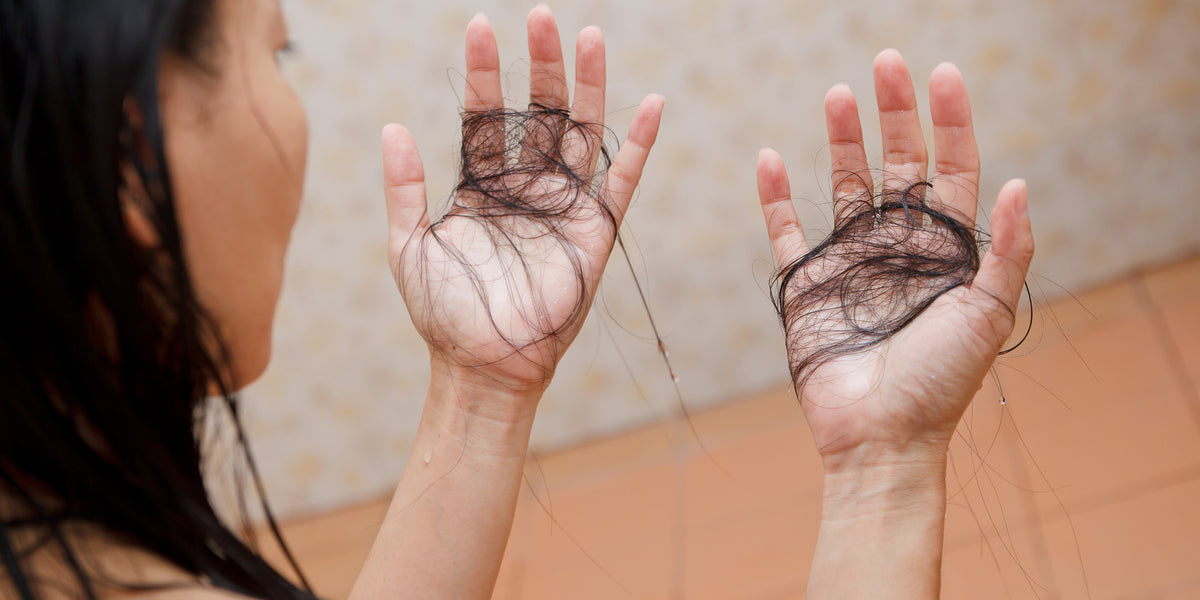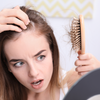What Causes Hair Loss? Tips to Restore Your Hair Length.

Have you been noticing more hair in your brush than usual, or have you found bald spots on your scalp? Your hair may be coming out in clumps, and you may be struggling to find a product that works. You are not alone! We understand how frustrating it is to have thinning hair and scalp problems.
It is common for people to lose hair at some point in their lives, but don't worry—you can fix it! Yes, it is still possible to restore your hair to its youthful condition. It's important to find a product that's right for your hair type. Before we get to the solution, let's take a look at what causes hair loss.
Causes of Hair Loss
Some common causes for hair loss are Autoimmune disorders like alopecia areata, hormonal imbalance (such as during pregnancy), medications, stress, physical trauma, and nutritional deficiencies such as iron deficiency which could cause hair fall in women.
Female/ Male Pattern Baldness
Also known as Androgenetic alopecia (AGA), it is a type of hair loss that affects both men and women. A woman with female-patterned baldness has thinning hair across her entire scalp, rather than just at the front or on the crown like man-patterned baldness.
The condition is genetically inherited and causes the hair to become thinner and fall out and ultimately affecting the volume of the hair. Women tend to experience female pattern baldness as they age, even though it can happen earlier.
It is important to note that every woman experience different hair loss patterns. Some women may experience a widening part on their scalp or gradual thinning of their hair across the entire scalp.
Hormonal changes due to Childbirth and Pregnancy can cause hair loss
A large amount of estrogen is produced by your body when you're pregnant, which causes your hair to become thick and glossy. This may be true for some women. Some moms report hair loss during pregnancy, particularly those with a family history of female alopecia.
Hair thinning and shedding during pregnancy is a condition called telogen effluvium. It's normal for some women to experience telogen effluvium during pregnancy, where hormonal changes may cause it—and it can happen after childbirth, too, due to a drop in estrogen levels.
More hairs enter the resting phase of their growth cycle and are shed more quickly, resulting in temporary thinning or balding on the scalp. This can happen due to a major life event, sudden weight loss, or other physical stressors.
Menopause can cause hair loss
Hormone imbalance during menopause may be the culprit behind your hair loss. During menopause, your body begins to produce less estrogen, which causes the hair on your head to thin out and fall out more quickly. Also, the use of birth control pills causes thinning of hair and hair loss.
Heredity
If your parents had a history of hair loss, you are more likely to experience it as well.
The use of certain drugs may result in hair loss.
Certain drugs may result in hair loss. Drugs that have been associated with alopecia include:
- Cancer drugs (chemotherapy)
- Drugs used to lower cholesterol and blood pressure levels
- Birth control pills
- Depression and mood disorder medications and hormone replacement therapy medication
- Nonsteroidal anti-inflammatory drugs (NSAIDs)
- Heart disease medications
- Thyroid medications
- Certain antibiotics can also cause hair loss
Hair Loss due to Various Health conditions
Several health issues can cause hair loss. If you are experiencing hair loss, it is essential to rule out any underlying conditions before starting any treatment.
- Alopecia areata
An autoimmune disease that attacks the hair follicles and causes patchy bald spots to appear on the scalp and results in hair loss. It can affect the entire body, but it most often occurs on the scalp.
- Trichotillomania
A hair-pulling disorder called trichotillomania involves compulsively pulling out one's own hair—typically from the head, eyebrows, eyelashes, and beard.
- Ringworm
A fungal infection that can affect both the skin and hair, resulting in hair loss and patches on the scalp that are either round or oval in shape. The area around the patches may also be itchy. If you suspect you have ringworm, you need to consult your doctor immediately.
Hair Loss Due to Chronic Stress:
Bald spots, thinning hair, and a dry scalp may be triggered by stress. Chronic stress affects the hormones that regulate hair growth. Some women experience significant hair loss after experiencing stressful events such as childbirth, the death of a loved one, or divorce.
If you've noticed that your hair is thinning or falling out, it's time to take a break from whatever is stressing you out to get back on track with your hair health!
Radiation therapy
Using radiation therapy to treat cancer can also cause hair loss, and the hair may not grow back the same way. If you're about to undergo radiation therapy, talk with your doctor about ways to protect your scalp and manage hair loss.
Thyroid disorder and hair loss
Hypothyroidism or Hyperthyroidism an autoimmune disease can lead to dry, thin hair and, ultimately, hair loss. Facing this issue head-on by consulting a medical specialist right away can help you tackle any underlying hormone imbalances with proper care and prevent further hair damage from occurring. All it takes is some understanding and self-care measures to restore your beautiful locks!
Hairstyles and treatments
Certain hairstyles like braiding or tight ponytails can cause breakage or damage to the roots of your hair (Traction alopecia). Excessive hair coloring can cause permanent damage to your scalp and follicles due to the chemicals in the dye.
Traction alopecia also results from excessive heat-styling tools, such as curling irons or flat irons for straitening, curling, or blow-drying hairs, which can cause thinning of hair, making them dry and brittle and contribute to hair loss.
Dietary Deficiencies
Another factor that can contribute to hair loss is dietary deficiencies. When you don't consume enough Vitamin B12 or iron in your diet, your body will suffer from nutritional deficiencies that may lead to hair loss.
If you eat a vegetarian diet or follow a vegan lifestyle and do not eat red meat, you may be at risk for iron deficiency. Iron deficiency is another common cause of hair loss in women.
The best way to overcome this deficiency is to add red meat to your diet. However, if you don't eat red meat or follow a vegetarian diet, there are still ways for you to get more iron into your body:
For instance, taking multivitamins containing iron are a good choice. Moreover, eat more leafy greens (spinach, kale, beet greens), which are a good source of iron. Drink tea or coffee with your meals; both contain substances that help your body absorb more iron from food.
How to Prevent Hair Loss?
If you're noticing more hair in your brush, it might be time to look at your hair care routine. The following tips will help you prevent hair loss in women.
Don't wear hairstyles that pull on your hair: Avoid hairstyles that involve putting your hair in a tight bun or braid.
Avoid hair styling tools: Hair dryers, curling irons, and flat irons all damage your hair by exposing it to heat, which can cause breakage and split ends. If you must use one of these tools, make sure to use a hair serum or spray before styling your hair—this will help protect your strands from heat damage.
Avoid dying or bleaching your hair too often: This puts more stress on follicles than they're meant to handle and can cause damage over time!
Eat a Healthy Diet: Make sure you're getting enough protein in your diet (try eating foods like eggs, chicken breast, and tuna fish) and staying hydrated with plenty of water throughout the day so you don't become dehydrated, which can lead to hair loss.
Get enough sleep: This will help keep your body functioning at its best while also helping prevent stress (another major factor in hair loss).
Use a hair serum as a part of your routine: Use a hair serum that is designed to help protect your hair against damage and provide nutrients that strengthen the roots and make it easier to grow new strands.
It's also important not to use any products that may irritate your scalp - try using a gentle shampoo and conditioner instead of harsh ones for sensitive scalps.
While some types of hair loss are only temporary, others may require treatment to prevent further shedding. In order to strengthen your existing hair strands and nourish your scalp, consider using a hair serum enriched with moisturizing ingredients and has DHT blocker ingredients for those suffering for severe hair loss.





